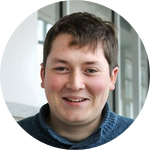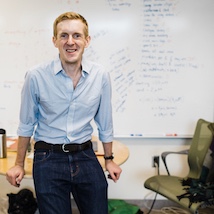About This Project
The fast-growing microbe Vibrio natriegens has an extraordinary ability to consume and integrate DNA from its environment. We believe that by ‘feeding’ DNA to a growing population of V. natriegens, as opposed to having to stop and introduce mutations in discrete rounds, we will enable faster, more accessible, and higher throughput cloning and in vivo directed evolution than has ever been achieved using any platform, accelerating protein engineering for climate biotech.
Ask the Scientists
Join The DiscussionWhat is the context of this research?
Enzymes are an unassailable ally in the fight against climate change: scalable, growable molecular machines which not only abate carbon emissions, but transform them into valuable resources. With the power of protein engineering, we are reshaping our future, one molecule at a time.
An explosion in the possibilities is being driven by plummeting costs for DNA synthesis and assembly and accessible AI-driven protein design and discovery. However, these advancements will be held back by the tools of in vivo conventional molecular biology which have not kept up with advancement in silico. The risk is not that biology isn’t capable of addressing emissions, but rather that we will be limited in our ability to explore the space of protein design fast enough to address climate change.
What is the significance of this project?
Typically, mutant protein libraries are produced using chemically competent cells - cells (usually E. coli) which have been chemically rendered capable of taking up DNA. Because these cells need to be newly made ‘competent’ for each round of engineering, targets for directed evolution in vivo must be changed step by step. Further, managing fragile competent cells increases the costs of automated cloning and screening of new proteins.
Both (1) decreased costs and increased accessibility for high-throughput screens of proteins and (2) continuous but targeted directed protein evolution in vivo could play a major role in accelerating the advancement of proteins for carbon fixation and utilization.
What are the goals of the project?
Our goal is to produce an ideal microbial chassis for in vivo directed evolution, production, and high-throughput screening of novel proteins, able to:
- Uptake DNA in rich media without serial chemical treatments (enhanced natural competence)
- Grow and be transformed at room temperature without shaking for massive automated screening applications
- Undergo targeted editing and mutagenesis (both genomic and plasmid) continuously and ‘on-the-fly,’ with targets transiently chosen at will and informed by population-level NGS
To be clear - what we are developing is useful not only for our own climate protein engineering goals, but for other collaborators in the Garden who could benefit from a better synthetic biology host for accelerated protein evolution.
Budget
n/a
 Project Timeline
Project Timeline
n/a
Dec 31, 2024
Completion Date
Meet the Team
Affiliates
Team Bio
In the Barstow Lab, we're passionate believers in the potential of unique microbes to address our sustainability challenges. Postdocs David Specht, a physicist, Bryce Brownfield, a structural biologist, and research scientist TJ Sheppard, a biological engineer, are teaming up to make a microbial platform based on Vibrio natriegens for cloning and directed evolution to accelerate climate biotech.
David Specht
I'm a postdoctoral researcher interested in pursuing the intersection that exists between physics, biology and sustainability. I hold a PhD in Applied Physics from Cornell University and a Bachelors in Physics with a minor in Environmental Science and Policy from the College of William & Mary.
My interest in the intersection between physics and biology led to my PhD in the Lambert Lab, where I studied the physics of CRISPR, a biological system that enables human-programmable interaction with DNA. I used next generation sequencing to study the sequence-specific determinants of binding of the CRISPR protein Cas12a, and how the binding of these proteins can be used to control gene expression via synthetic gene circuits. Through my PhD research, I discovered how powerful synthetic biology - our new ability to engineer organisms at a high level - can be. In particular, my PhD research into the design of CRISPR-based genetic circuits in E. coli has inspired me to think about how these new biological engineering capabilities in microbes can be moved from the lab into the real world.
I was attracted to the Barstow Lab, opting to remain at Cornell, because of advancements here in a truly unique field - electroactive microbes, which can can use direct transfer of electrons through an electrode to drive metabolic activity, which has extraordinary implications for sustainability if it can be successfully leveraged. In the course of my research, I've discovered that one such electroactive microbe, Vibrio natriegens, has intrinsic abilities that make it especially easy to engineer, and a phenomenal target for making sustainable fuels, foods, and complex biomolecules using electricity.
Bryce Brownfield
Bryce Brownfield began his career as an advocate for climate/environmental issues in 1998, when as a 2nd grade student he gathered the school assembly to discuss deforestation of the Amazon. He went on to debate climate issues in high school, and finally discovered his passion for climate biotechnology as an undergraduate at the University of Colorado. Bryce worked on a pioneering project to engineer enzymatic cellulose cellulose degradation in Saccharomyces cerevisiae, by designing a large multi-subunit complex known as a cellulosome. Fascinated by the potential of engineering ultrastructural features in biosynthetic systems, Bryce went on to study membrane trafficking at Cornell University, where he earned his PhD. Understanding the features of a cell's penultimate barrier is applicable to every biological engineering problem. Relevant functionally as a scaffold or selectivity filter, or technically as a barrier through which materials and/or information must be exchanged. Now, Bryce is excited to apply his expertise in cell biology to enhance the effectiveness of biosynthetic climate solutions.
TJ Sheppard
I have long been inspired by the potential of synthetic biology to tackle our worlds unsolvable problems. With the power of millions of years of evolution on our side, microbes provide the perfect chassis to uncover novel solutions to inescapable challenges. Holding a Masters in Microbiological Engineering from Cornell University, I plan on uncovering these answers and more.
Buz Barstow
Buz Barstow received his MSci in Physics from Imperial College, London where his research concentrated on quantum optics, plasma physics and table-top nuclear fusion. He received his Ph.D. in Applied Physics from Cornell University under the direction of Sol Gruner, where he demonstrated the direct correlation of protein structure and function using high-pressure X-ray crystallography. As a postdoctoral fellow in Pamela Silver’s laboratory at Harvard Medical School, he focused on the evolution of biological hydrogen production and the engineering of electroactive bacteria, and as a research fellow at Princeton Chemistry he developed the Knockout Sudoku technique for rapidly building whole genome knockout collections to characterize the genetics of biological capabilities for sustainable energy. As an assistant professor at Cornell, Buz is applying structural, systems and synthetic biology to the problems of energy and sustainability including biomining, carbon mineralization and electromicrobial production. Buz's lab recently launched REEgen, a company developing genetically engineered microbes for biomining. Buz is a recipient of William Nichols Findley Award, NIH National Research Service Award, and Burroughs-Wellcome Career Award at the Scientific Interface and a finalist for the Gregorio Weber International Prize in Biological Fluorescence.
Project Backers
- 0Backers
- 0%Funded
- $0Total Donations
- $0Average Donation



